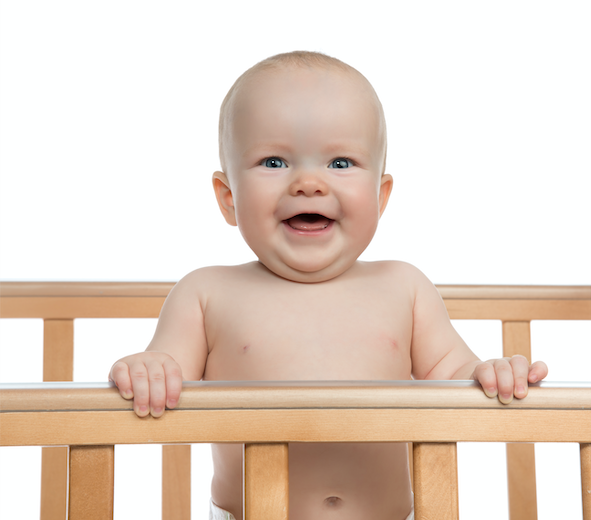Join the thousands of parents already raising smarter, happier babies with our online baby classes: The Active Babies Smart Kids series. Click here.
GymbaROO-KindyROO kids are excelling academically, emotionally, in leadership roles and on the sporting field. Find us at: GymbaROO-KindyROO
Written by Lynn Jenkins BA(Hons), MPsych (Clin) author of ‘Best Start’
A baby has been born. The birth was how it was – easy, hard, painful, pain-free. However it was, it’s all in the past now, and the whole point of the experience is lying in your arms. A tiny head resting in the crook of your elbow; puffy eyes adjusting to the extra light; the softest skin you’ve ever felt covering fingers, toes and a little nose. Wow. It’s pretty amazing to think that this little mini person has been curled up inside and is now out in this room, part of everything, stretching limbs and making sounds.
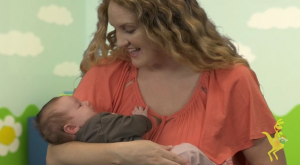 Their innocence is one of the purest we’ll ever witness in life. A newborn baby, whose vulnerability is evident straightaway. So tiny, and so dependent on us for absolutely everything. Their physical needs are very obvious and a bit like the proverbial ’squeaky wheel’ – they are in-our-face, demanding our utmost attention. Feeding, sleeping, changing – all vital parts of caring for this gorgeous new little being.
Their innocence is one of the purest we’ll ever witness in life. A newborn baby, whose vulnerability is evident straightaway. So tiny, and so dependent on us for absolutely everything. Their physical needs are very obvious and a bit like the proverbial ’squeaky wheel’ – they are in-our-face, demanding our utmost attention. Feeding, sleeping, changing – all vital parts of caring for this gorgeous new little being.
But what might sometimes become hidden by the ‘squeakiness’ of the seemingly endless physical needs are their emotional needs. Being a human baby is more than eating, sleeping and excreting. They also need to be able to eventually function within the social world they have been born into, and they need to learn the skills to do this.
They are born very much a junior member of the human race. They come with the basics – reflexes, nervous system, brain architecture, but these basics need to be nurtured and molded into a shape that will help this little baby deal with the complexities of human social and emotional life as they grow up. They have huge potential at birth to develop well socially and emotionally; everything is in place ready to go, and they need some help for this potential to be realised.
And they are put in our trusted hands to do this. Aaaarggh! They come out and are literally placed in our hands and so begins this journey of teaching. It starts right away – eye contact, cooing, smiling, humming, singing, picking them up, soothing them, and so on. This is how we begin to equip them with the skills they will need. That is, by being in a relationship with them.
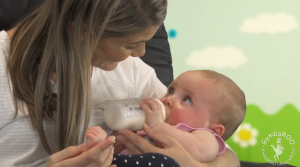 It is by being in a relationship with them that is characterised by care that is consistent in its lovingness, warmth, sensitivity and attentiveness, that we are teaching them their very first emotional lessons; that they are valuable, that they can trust, feel confident that they will get the help they need, and feel safe and secure. Over time they develop a ‘knowing’ about all these things and about themselves. And these are their emotional foundations – the ‘shakiness’ or ‘firmness’ of their foundations is influenced by how they are interacted with and treated in every day care.
It is by being in a relationship with them that is characterised by care that is consistent in its lovingness, warmth, sensitivity and attentiveness, that we are teaching them their very first emotional lessons; that they are valuable, that they can trust, feel confident that they will get the help they need, and feel safe and secure. Over time they develop a ‘knowing’ about all these things and about themselves. And these are their emotional foundations – the ‘shakiness’ or ‘firmness’ of their foundations is influenced by how they are interacted with and treated in every day care.
Looking at a new baby you can really get a sense of just how vulnerable they are to how they are treated and interacted with. They are quite helpless to do anything for themselves and they look at us with so much trust. They have no option but to take whatever they’re given in terms of the quality of their care. They don’t yet know the difference between ‘good’ quality care and ‘not so good’ quality care. The way they are treated is just the way the world is.
BUT they will develop a sense over time that the way they are treated and cared for either feels good, comfortable, nice and safe, or whether it feels not so good, pretty unpredictable and quite unsafe most of the time.
And here within lies the responsibility of being a parent nurturing and shaping this new little baby. You could say babies are a bit like putty in our hands. The words we use, the tone we use, the way we pick them up, the way we handle things when they cry, when they smile, when they pull our hair and scratch our neck with their little nails (!), are all contributing to how they are developing emotionally. It’s like they adopt the type of care they receive and it becomes their ‘truth’ about themselves, the world and the people in it.
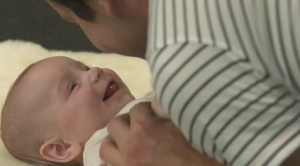 So part of their dependency on us is to help them to develop a genuine sense that they are all the clichés that are thrown about when they are born – ‘a blessing to behold’, ‘precious’, ‘a treasure’. Their ability to have a healthy self-worth, positive sense of themselves and trust in us has to be supported by us, just like their ability to crawl, stand up, eat and sleep well does.
So part of their dependency on us is to help them to develop a genuine sense that they are all the clichés that are thrown about when they are born – ‘a blessing to behold’, ‘precious’, ‘a treasure’. Their ability to have a healthy self-worth, positive sense of themselves and trust in us has to be supported by us, just like their ability to crawl, stand up, eat and sleep well does.
Babies’ and young children’s experiences with the significant people around them literally contribute to their brain development and whether it will develop the neural networks that will support ‘doing’ social and emotional things well or not; it shapes their views of themselves – whether they genuinely believe they are good, worthwhile, and valuable; and it shapes their views of other people- whether they can be trusted and depended upon.
‘Aaarggh!’, you might be saying – talk about pressure! Yes, the responsibility is a big one, because ideally we don’t want to do anything that might stop our babies and young children from looking at us with utter trust. But the reality is that we probably will say or behave in ways that are less than ideal at some stage(s) during their growing years. It is probably worth accepting the reality of this by acknowledging that it occurs because we are essentially people bringing up people. And as such we have our own ‘training’ with all things emotional from our parents, and theirs from their parents and so on.
Rather than becoming preoccupied with the times we don’t get ‘it right’, it will be more helpful all round if we have a think about what sort of parents we would like to be and aim for it. We will fall off the track sometimes, but being aware that we’ve fallen off, could be seen as an opportunity to remind ourselves how we want to ‘be’ as a parent, ‘repair’ things with our kids and ourselves, and keep moving forward.
If giving some attention to their emotional development features in the parenting ‘ideal’ then having the aim to approach interactions with babies and children in ways that are mindful of their emotional needs will be heading in the right direction.
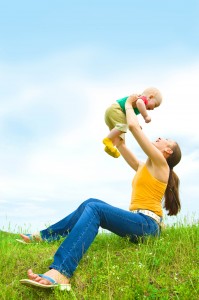 Broadly and simply, these needs are to feel safe and secure in their relationship with us. If they are feeling safe and secure, then they are receiving the type of care that makes them feel loved, valued and worthwhile, with people around them on whom they can depend and place their trust.
Broadly and simply, these needs are to feel safe and secure in their relationship with us. If they are feeling safe and secure, then they are receiving the type of care that makes them feel loved, valued and worthwhile, with people around them on whom they can depend and place their trust.
Babies aren’t after perfection from us; they are happy with the type of care that naturally follows loving devotion to them. From their point of view it’s quite simple: to grow up feeling good about themselves and to be able to participate in this social and emotional world they’ve been born into.
Active Babies Smart Kids – Online Baby Classes
GymbaROO-KindyROO’s online series of baby classes is taking the parenting world by storm! It is highly recommended by doctors, paediatricians, early childhood experts and the Maternal Child and Family Health Nurses Association. This series is being called: “The essential guide for parents”. Join the thousands of parents already playing with their babies from birth, in the best way for brain and body development and laying crucial foundations for future learning. What happens in the first year, not only matters, it matters a lot!
Active Babies Smart Kids BabyROO series – Click here.
Try the first class FREE! Click here to watch our Active Babies Smart Kids Episode 1 – Tummy Time
GymbaROO-KindyROO
Thousands of parents, babies and children are presently involved in our programs and creating rising stars. GymbaROO-KindyROO kids are excelling academically, emotionally, in leadership roles and on the sporting field. Come join all the fun and learning! “GymbaROO – The best decision I ever made for my child.” Classes from 6 weeks old – 7 years GymbaROO KindyROO
Enjoy the following GymbaROO-KindyROO articles
GymbaROO-KindyROO: Who, what, where, why and how
All about GymbaROO-KindyROO’s online baby classes for parents and babies: Active Babies Smart Kids
How to raise a smarter, happier baby
Why active babies make smart kids
Become a GymbaROO-KindyROO franchisee
What babies really want: Developmentally brilliant gifts for babies.
Why creeping and crawling matter.
Please do not sit me until I can do it myself.
An important warning for all parents of babies.
Click here for more GymbaROO-KindyROO article choices

